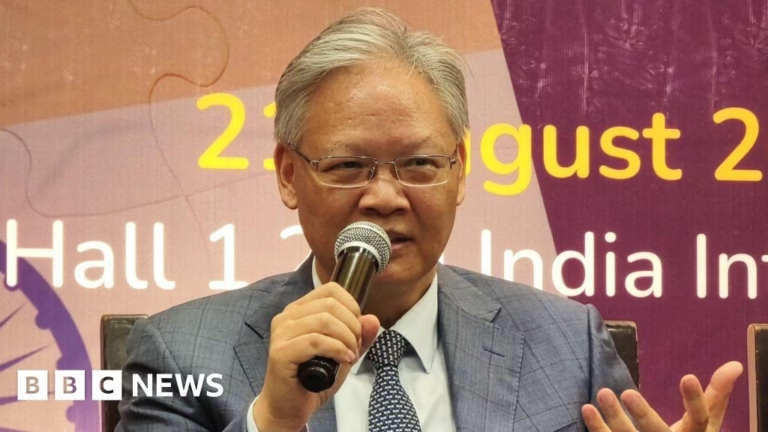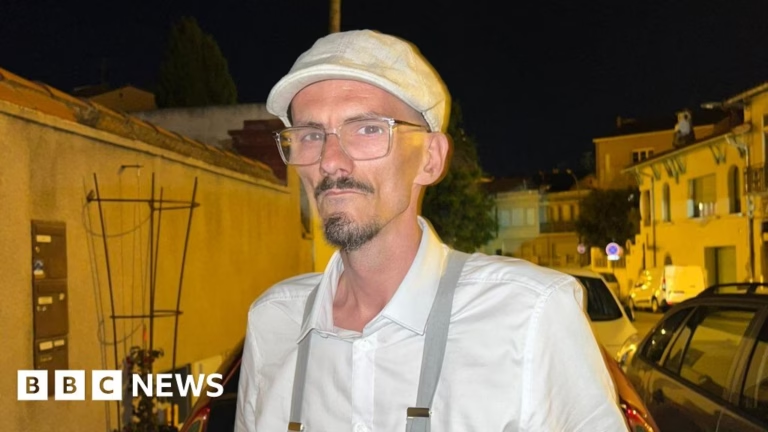(80509800-0004-11f0-94e3-e9eb8df1ddd1).webp) AFP
AFPMehboob Hussain was riding the train home on Tuesday when the tracks under the front car exploded.
In the depths of central Pakistan’s Bolan Pass, a pocket of wilderness so remote that there is no internet or mobile network coverage, the nine-coach Jaffar Express ground to a halt. Then the bullets started flying.
“I was a passenger on the train that was attacked,” Mr Hussain told BBC Urdu.
He, along with some 440 others, had been travelling from Quetta to Peshawar through the heart of the restive Balochistan province when a group of armed militants struck – they bombed the tracks, fired on the train and then stormed the carriages.
The Balochistan Liberation Army (BLA) quickly claimed responsibility for the siege, and threatened to kill many of those on board if Pakistani authorities did not release Baloch political prisoners within 48 hours.
The group, which many countries have designated a terrorist organisation, has waged a decades-long insurgency to gain independence for Balochistan,accusing Islamabad of exploiting the province’s rich mineral resources while also neglecting it.
BLA militants have a long history of attacking military camps, railway stations and trains in the region.
But this was the first time they had hijacked one.
The siege lasted over 30 hours. According to authorities, 300 passengers have now been freed, and 33 BLA militants, 21 civilian hostages and four military personnel were killed. But conflicting figures suggest many passengers remain unaccounted for.
Information relating to the attack and the subsequent rescue operation has been tightly controlled throughout.
But the BBC was able to speak to multiples eyewitnesseses who described the “doomsday scenes” on board the train as the attack unfolded.
As Ishaq Noor told BBC Urdu of those first few moments: “We held our breath throughout the firing, not knowing what would happen next.”
A gunfight
A railway police officer who was on board the train told BBC Urdu that, contrary to initial reports from Pakistani authorities, the train was “not in a tunnel but in an open area” when it was hit.
The BLA has also released an alleged video of the moment the train was struck by the blast. It shows an open section of track that runs along the base of a large rocky slope.
Atop that slope, according to the video, is a cluster of BLA fighters.
The officer described to the BBC how he initially “fought together with other police officers” to try and hold off the militants until “the ammunition ran out”.
“They [the BLA] were moving in front of us on the mountain and they were much more numerous than us, in the hundreds,” the officer, who spoke on condition of anonymity, recalled. He noted that he was accompanied by four railway police and two members of Pakistan’s paramilitary Frontier Corps (FC).
At least 100 of those on the train were members of the security forces, according to Pakistani officials.
(162ecb40-0004-11f0-94e3e9eb8df1ddd1).webp) Reuters/Hakkal Media
Reuters/Hakkal Media“I told my companion to give me the G-3 rifle because it is a better weapon,” the officer explained. “When I got the rifle and the rounds, we also started firing back. I used to fire one shot at a time at them so that they could not come near us and the train … [But] in an hour-and-half, our rounds were over… We were helpless.”
When the gunfire from those on board the Jaffar Express ceased, the militants came down from the surrounding mountains and started taking passengers off the train, the officer said.
“They started checking cards and telling people to go this way, this way,” he said, explaining that the hostages were separated into groups alongside the train, according to their ethnicity.
The militants were speaking in the Balochi language, he added, and declared, “We have made demands to the government and if they are not met, we will not spare anyone; we will set the vehicle on fire”.
The officer claimed the militants were receiving orders: “They would get orders to kill, and they would pick up people from the group and kill them. They killed many people – both army personnel and civilians.”
The first release
Some passengers, however, were allowed to leave unharmed – including women, children, the elderly and those who lived in Balochistan, according to Mr Noor.
Among those released was Noor Muhammad. He said that when the initial volleys of gunfire stopped after an hour, armed men forced open the door to the train and entered, saying “get out or we will shoot you”.
Mr Muhammad said he was escorted off the train, and when he told the militants his wife was still in the back of the car, they brought her out too. Then they “told us to go straight and not look back”.
The couple walked through the wilderness, he said, and with “great difficulty” reached Panir Railway Station at about 7pm, where they rested.
His wife recalled the moment the Pakistan military arrived to meet them.
“They told me, ‘ma’am, come inside with us, we will take you home safely,'” she said. The soldiers took the couple to the town of Machh, she added, “and then we reached Quetta to our children, who were waiting for us”.
Some passengers who managed to leave the train late on Tuesday evening said they walked for nearly four hours to reach the next railway station. They included Muhammad Ashraf, who had been riding the train to Lahore to visit his family.
“We reached the station with great difficulty,” he told BBC Urdu, “because we were tired and there were children and women with us.”








